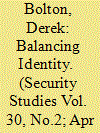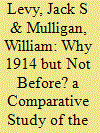|
|
|
Sort Order |
|
|
|
Items / Page
|
|
|
|
|
|
|
| Srl | Item |
| 1 |
ID:
180458


|
|
|
|
|
| Summary/Abstract |
Scholarship on ontological security (OS), the security of being, reveals how national narratives delineate communities within which individuals have OS and how the corresponding self-interest in upholding these narratives influences foreign policy. A hereto-unexplored implication of these works is how the desire to maintain national narratives influences decisions on balancing and bandwagoning. The article uses Raymond Aron’s classical realism to develop an OS theory of balancing, drawing upon what it argues are his “early OS intuitions.” Specifically, using Aron’s concept of “secular religion,” the article shifts the analytical focus of current ideological approaches of balancing toward the “secular religion” of nationalism. It argues decisions on balancing and bandwagoning are made with reference to perceived (in)compatibility between national narratives and the distribution of power. The case of North Korean responses to the Sino-Soviet split demonstrates the utility of an OS perspective on balancing compared to traditional balance of power formulations.
|
|
|
|
|
|
|
|
|
|
|
|
|
|
|
|
| 2 |
ID:
180455


|
|
|
|
|
| Summary/Abstract |
What resources and technologies are strategic? Policy and theoretical debates often focus on this question, since the “strategic” designation yields valuable resources and elevated attention. The ambiguity of the very concept, however, frustrates these conversations. We offer a theory of when decision makers should designate assets as strategic based on the presence of important rivalrous externalities for which firms or military organizations will not produce socially optimal behavior on their own. We distill three forms of these externalities, which involve cumulative-, infrastructure-, and dependency-strategic logics. Although our framework cannot resolve debates about strategic assets, it provides a theoretically grounded conceptual vocabulary to make these debates more productive. To illustrate the analytic value of our framework for thinking about strategic technologies, we examine the US-Japan technology rivalry in the late 1980s and current policy discussions about artificial intelligence.
|
|
|
|
|
|
|
|
|
|
|
|
|
|
|
|
| 3 |
ID:
180459


|
|
|
| 4 |
ID:
180454


|
|
|
|
|
| Summary/Abstract |
In the last decade resource curse scholars have argued widely that oil-rich countries are more likely to initiate armed disputes with their neighbors. In this essay, we argue that the evidence points toward oil peace, not conflict, as a function of both domestic and international factors. We draw on analyses of our own dataset and two from past studies to show that the data is more supportive of petro-peace than of petro-aggression. We also demonstrate that the Iran–Iraq War is singularly responsible for what was believed to have been a radical-petro-aggression effect globally. We conclude that, to the extent that evidence suggests a trend, it is more likely for a Pax Petrolica.
|
|
|
|
|
|
|
|
|
|
|
|
|
|
|
|
| 5 |
ID:
180457


|
|
|
|
|
| Summary/Abstract |
Operation Rolling Thunder’s failure has been widely blamed on the strategy of using force to send “signals.” It discredited the associated theory of coercion among a generation of military officers and scholars. In this paper I show that, whatever its other failures, Operation Rolling Thunder did successfully signal a threat. I rely on the latest research to demonstrate that Hanoi believed the bombing would eventually inflict massive destruction. I also show that Washington accurately ascribed the failure of the threat to North Vietnam’s resolve and continued the operation for reasons other than signaling. These findings show that Operation Rolling Thunder can be productively understood as an exercise in both signaling and countersignaling. Rather than discrediting the theory of coercion, these findings modify it. They show that failed threats can be informative and that coercive campaigns can become prolonged for reasons other than a lack of credibility.
|
|
|
|
|
|
|
|
|
|
|
|
|
|
|
|
| 6 |
ID:
180456


|
|
|
|
|
| Summary/Abstract |
Why did the July 1914 crisis—but not crises in 1905, 1908–9, 1911, and 1912–13—escalate to great-power war despite occurring under similar international and domestic conditions? Explanations based on underlying and slowly changing structural, social, or cultural variables cannot answer this question. Examining three Balkan crises of 1912–13 and the July Crisis, we refine realist explanations based on power, alliances, and reputational interests by incorporating the impact of changing power distributions and alliances in the Balkans on the great-power security system. A more complete answer to the why-1914-but-not-before question, however, requires the incorporation of Franz Ferdinand’s assassination, which went beyond a pretext for war. It eliminated the most powerful and effective proponent for peace in Vienna and fundamentally changed the nature of the decision-making process in Austria-Hungary. Counterfactually, we argue that a hypothetical crisis with Franz Ferdinand present would probably have ended differently.
|
|
|
|
|
|
|
|
|
|
|
|
|
|
|
|
|
|
|
|
|